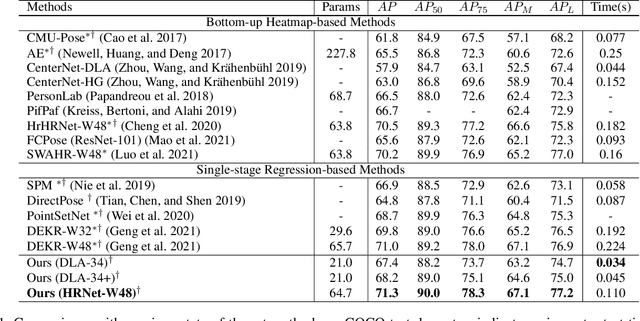Mingshu He
QueryPose: Sparse Multi-Person Pose Regression via Spatial-Aware Part-Level Query
Dec 15, 2022



Abstract:We propose a sparse end-to-end multi-person pose regression framework, termed QueryPose, which can directly predict multi-person keypoint sequences from the input image. The existing end-to-end methods rely on dense representations to preserve the spatial detail and structure for precise keypoint localization. However, the dense paradigm introduces complex and redundant post-processes during inference. In our framework, each human instance is encoded by several learnable spatial-aware part-level queries associated with an instance-level query. First, we propose the Spatial Part Embedding Generation Module (SPEGM) that considers the local spatial attention mechanism to generate several spatial-sensitive part embeddings, which contain spatial details and structural information for enhancing the part-level queries. Second, we introduce the Selective Iteration Module (SIM) to adaptively update the sparse part-level queries via the generated spatial-sensitive part embeddings stage-by-stage. Based on the two proposed modules, the part-level queries are able to fully encode the spatial details and structural information for precise keypoint regression. With the bipartite matching, QueryPose avoids the hand-designed post-processes and surpasses the existing dense end-to-end methods with 73.6 AP on MS COCO mini-val set and 72.7 AP on CrowdPose test set. Code is available at https://github.com/buptxyb666/QueryPose.
AdaptivePose: Human Parts as Adaptive Points
Dec 27, 2021



Abstract:Multi-person pose estimation methods generally follow top-down and bottom-up paradigms, both of which can be considered as two-stage approaches thus leading to the high computation cost and low efficiency. Towards a compact and efficient pipeline for multi-person pose estimation task, in this paper, we propose to represent the human parts as points and present a novel body representation, which leverages an adaptive point set including the human center and seven human-part related points to represent the human instance in a more fine-grained manner. The novel representation is more capable of capturing the various pose deformation and adaptively factorizes the long-range center-to-joint displacement thus delivers a single-stage differentiable network to more precisely regress multi-person pose, termed as AdaptivePose. For inference, our proposed network eliminates the grouping as well as refinements and only needs a single-step disentangling process to form multi-person pose. Without any bells and whistles, we achieve the best speed-accuracy trade-offs of 67.4% AP / 29.4 fps with DLA-34 and 71.3% AP / 9.1 fps with HRNet-W48 on COCO test-dev dataset.
 Add to Chrome
Add to Chrome Add to Firefox
Add to Firefox Add to Edge
Add to Edge